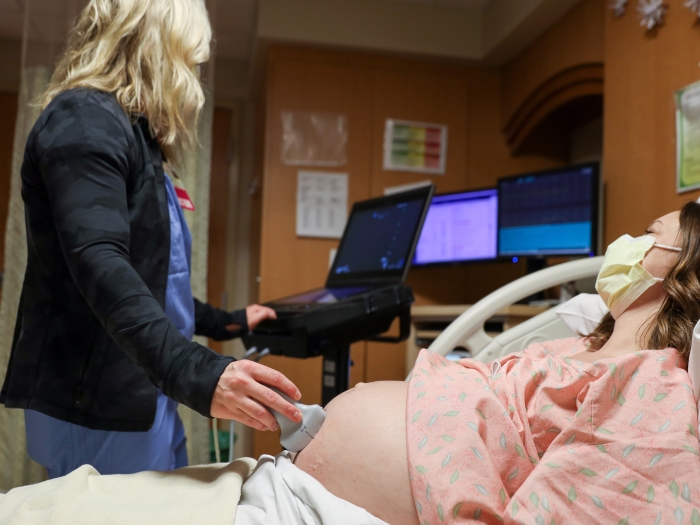Often driven by insurers, delays in approving weight-loss surgery can deter some patients from the pursuit. And waiting longer doesn’t improve safety, a new study says.
7:00 AM
Author |

Diagnosed with type 2 diabetes, high cholesterol and borderline high blood pressure, Dana Hayes pursued bariatric surgery in hopes of living a healthier life.
LISTEN UP: Add the new Michigan Medicine News Break to your Alexa-enabled device, or subscribe to our daily audio updates on iTunes, Google Play and Stitcher.
"I struggled with weight my whole life, but this was a place I'd never been before," says Hayes, 30, a hairdresser and mother of four. "Diabetes was the final straw."
She waited five months for surgery after her first clinic appointment.
That wait is not uncommon: Eligible patients are increasingly facing longer waits for operations proven to help them safely lose weight that endangers their health, according to a new study published in the Annals of Surgery.
In the first multi-institutional look at bariatric surgery wait times in the United States, surgeons examined data collected by the Michigan Bariatric Surgery Collaborative (MBSC) on 60,791 patients who had bariatric surgery in Michigan.
In 2006, patients typically had their bariatric surgery 86 days after their first clinic visit. By 2016, wait times had nearly doubled to 159 days.
"Prolonged wait times can be discouraging and increase the chance that patients will drop their pursuit of surgery," says study author Oliver Varban, M.D., an assistant professor of surgery at the University of Michigan and director of the Adult Bariatric Surgery Program. He also performed Hayes' surgery.
Because more surgeons have begun performing bariatric surgery in Michigan over the past decade, finding an available doctor had minimal impact on scheduling, authors affirmed.
Why surgical delays occur
Researchers used the data to create two study groups: a shorter wait time group that had a median wait of 67 days and a longer wait time group that waited 204 days or more for surgery.
After one year, patients in the longer wait time group had lost 56.6 pounds compared with the shorter wait time group in which average weight loss was 58.9 pounds.
Patients with complex medical histories enrolled in Medicaid experienced the longest delays. Nonwhite patients also waited longer, but in Michigan they are more often enrolled in Medicaid.
MORE FROM THE LAB: Subscribe to our weekly newsletter
Smokers and patients with high cholesterol or psychological disorders also had longer wait times for bariatric surgery.
But there was no major effect on well-being: Among all recipients, serious complications occurred in just 2 percent of patients in the first month after surgery.
So why do patients face longer wait times to receive bariatric surgery compared with surgeries to treat other life-threatening conditions such as cancer and heart disease?
One big reason: Many insurance companies require them to lose weight before the surgery, even though there's no data or evidence to prove preoperative weight loss affects long-term success.
Some insurers, including Medicaid, want documentation of supervised diet attempts. Patients may lose some weight that improves their health conditions, but the benefits won't last unless the patients can keep the weight off.
"Showing that patients waiting longer are not experiencing fewer complications or better comorbidity resolution than those with shorter wait times argues for streamlining the preoperative optimization process and against insurance-mandated weight-loss documentation," says U-M general surgery resident Rafael Alvarez, M.D., lead author of the study.
Insurer mandates can result in a delay in care, study authors say, and such policies should be re-examined considering their unclear benefit to patients.

A push for timely intervention
The study team members recognize that their data cannot gauge attitudes or second thoughts.
Cautious doctors may overestimate surgery risk, and patients can get cold feet and intentionally delay surgery. And the study was not able to measure the availability of other specialists, such as registered dietitians, who are needed to guide patients through a successful health transformation.
SEE ALSO: Approving Bariatric Surgery at Lower BMI May Improve Patient Outcomes
Even without the practice-specific details, the work led by U-M surgeons is the most robust examination of bariatric surgery wait times in the U.S.
About 95 percent of patients undergoing bariatric surgery in Michigan are enrolled in the MBSC registry used for the study.
Surgeons across the state share information about their cases via MBSC with the intent of recognizing practice trends and patient outcomes in a way that a single doctor or even a hospital would be able to do on their own — namely whether suitable patients receive bariatric surgery in a timely fashion.
After a onetime weight of 285 pounds, Hayes has lost 30 pounds in a little more than two months after gastric sleeve surgery. Her recovery was event-free; she returned to work in two weeks.
The steady decline in weight has given Hayes a welcome boost of energy for work and family life. Her blood sugar levels are normal.
And Hayes has talked to a dietitian about how to get adequate nutrition now that she is consuming less food.
"My only regret," she says, "is that I didn't do it sooner."
Photo by Bryan McCullough

Explore a variety of health care news & stories by visiting the Health Lab home page for more articles.

Department of Communication at Michigan Medicine
Want top health & research news weekly? Sign up for Health Lab’s newsletters today!





